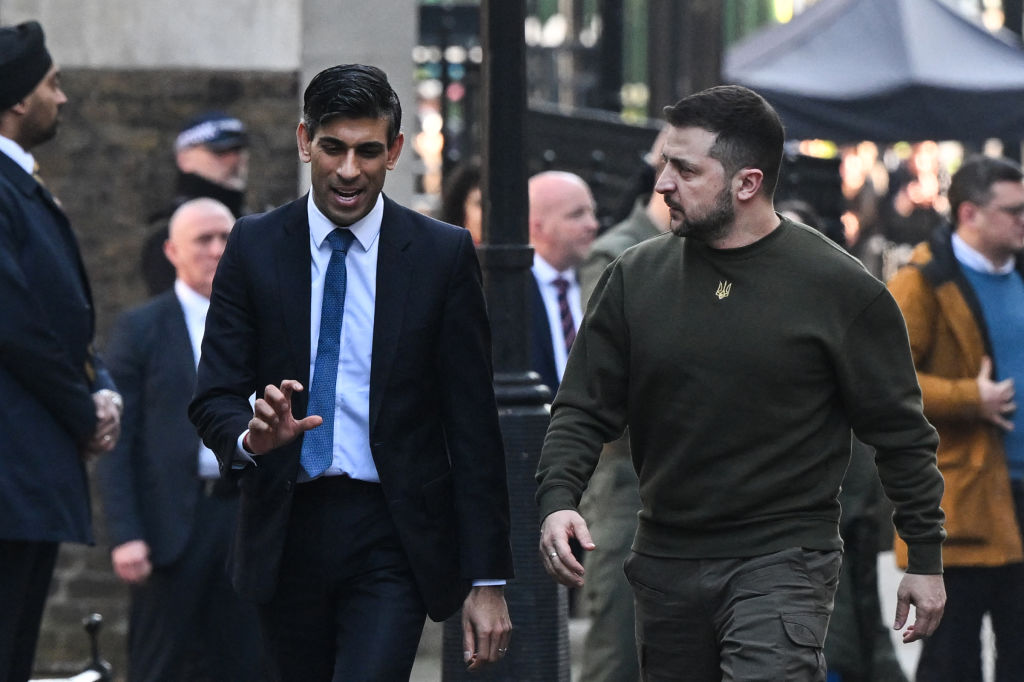When Ukrainian President Volodymyr Zelensky addressed British lawmakers in parliament as part of a surprise visit to the U.K. on Wednesday—only his third international trip since the Russian invasion began last year—he had a simple message aimed at the international community.
“Leaving the British Parliament two years ago, I thanked you for delicious English tea,” Zelensky, donning his trademark olive green sweater, recalled to a packed Westminster hall about his first visit to Britain as Ukraine’s President in 2020. “I will be leaving the Parliament today thanking all of you in advance for powerful English planes.”
There was little ambiguity in what the Ukrainian President was asking for. While much of his 20-minute address was dedicated to thanking Britain for its unwavering support for Kyiv “since day one,” it also served as a clarion call to provide Ukraine with modern fighter jets—an ask that governments in the U.S. and Europe have so far rebuffed.
Read More: Biden Ruled Out F-16s for Ukraine. But the Debate Over Fighter Jets Is Starting to Roar
But there are signs that Western opposition to sending jets may be starting to fade. Just hours before Zelensky’s arrival, the British government announced that it would begin training Ukrainian pilots to fly NATO-standard fighter jets as part of a “long-term capability investment,” making it the first Western allied country to do so. The move marks a striking shift from the British government’s position only a week ago, when a government spokesperson described sending jets as impractical on the grounds that the U.K.’s fighter jets are “extremely sophisticated and take months to learn how to fly.”
In a joint press conference following Zelensky’s address to British lawmakers, Prime Minister Rishi Sunak said “nothing is off the table” when asked about Ukraine’s request for fighter jets. Ben Wallace, Britain’s defense minister, is reportedly “actively” looking into whether the U.K. government can send military jets to Ukraine.
These moves may signal a recognition that Ukraine receiving fighter jets from its allies is a matter of when, not if. “The impossible has become possible more than once in terms of supporting Ukraine,” says Greg Bagwell, a former senior Royal Air Force commander and president of the U.K. Air Power Association. Indeed, it was only weeks ago that the U.S. and Germany joined Britain in agreeing to send battle tanks to Ukraine after months of deliberation and debate. A similar standoff is now playing out over the issue of fighter jets: While the U.S. and Germany have so far proven reluctant to provide jets, France and the Netherlands have suggested that they are more open to doing so.
The U.S.’s own willingness to provide jets—specifically the American-made F-16s—is what may prove most decisive in how Kyiv’s European allies choose to respond. Germany, in particular, has proven particularly reluctant to act out of lockstep with Washington for fear of provoking a Russian escalation. (Berlin initially refused to send its own Leopard 2 tanks to Ukraine until the U.S. agreed to send its Abrams tanks. However, Britain had pledged on its own accord to send its Challenger 2 tanks even earlier.) Besides, should European countries wish to donate their stockpile of F-16s to Ukraine, they will need the Biden administration’s permission.

Still, the British government will undoubtedly come under pressure to take the lead in this area—if not from Kyiv and its allies, then certainly from within. Former Prime Minister Boris Johnson, who Zelensky paid tribute to in his address for rallying others “when it seemed absolutely, absolutely impossible,” has been a vocal proponent of sending Ukraine the heavy weapons it needs to repel the Russian invasion—a call he renewed today. Other lawmakers in attendance were noticeably moved by Zelensky’s address, which was repeatedly interrupted with spurts of loud applause.
“It is crucial that the U.K. and the international community maintains its support for the people of Ukraine as its people fight for freedom, democracy, and human rights,” Alyn Smith, a Scottish Nationalist Party lawmaker, told TIME following Zelensky’s address. “I absolutely believe that Ukraine will win and I look forward to seeing that day soon.”
It is that belief that Zelensky was counting on when he presented the House of Commons speaker Lindsay Hoyle with a helmet belonging to one of Ukraine’s most successful pilots, with a message scrawled on it: “We have freedom. Give us wings to protect it.”
More Must-Reads from TIME
- Donald Trump Is TIME's 2024 Person of the Year
- Why We Chose Trump as Person of the Year
- Is Intermittent Fasting Good or Bad for You?
- The 100 Must-Read Books of 2024
- The 20 Best Christmas TV Episodes
- Column: If Optimism Feels Ridiculous Now, Try Hope
- The Future of Climate Action Is Trade Policy
- Merle Bombardieri Is Helping People Make the Baby Decision
Write to Yasmeen Serhan/London at yasmeen.serhan@time.com